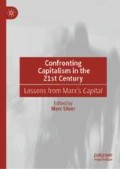Abstract
China, with its large tracts of land not fully capitalized and a peculiar “uneven” structure that articulates different modes of production together—the smallholdings, the nominal collective ownership, and the advanced form of post-Fordist capitalism—presents an interesting case for Marxian theory of accumulation. In this paper, I analyze how collective land ownership and subsistence agriculture serve to generate a huge army of cheap, flexible, and disposable labor force, and how the “small peasant family,” a crucial institution notable for its accumulation of “unwaged labor” and its capacity for “intensification of labor”, functions as an important institution to sustain such large-scale rotation of migrants between country and city. However, “collective ownership” still contains the possibility of dissociating laborers from the urban capital and reintegrating them with land for more productive use and thus indicates an alternative direction for China’s future development.
Access this chapter
Tax calculation will be finalised at checkout
Purchases are for personal use only
Notes
- 1.
Wen Tiejun points out, while most underdeveloped states would have to rely on the economic aid of foreign countries to accomplish the primitive accumulation for their industrialization, which often result in their political dependence on foreign capital, China chose the path of “internal primitive accumulation,” by extracting surplus value from the vast rural area to support the state’s industrialization . See Wen Tiejun, Baci weiji: Zhongguo de zhenshi jingyan 八次危机:中国的真实经验 1949–2009 (Eight Crises: Lessons from China, 1949–2009) (Beijing: Dongfang chubanshe, 2012), 5. Lin Chun points out, the “primitive accumulation” was done through the unequal “scissor price” in the exchange between the industry and agriculture, by trading the cheapened agricultural products with more expensive industrial goods. See Lin Chun, The Transformation of Chinese Socialism (Durham: Duke University Press, 2006), 66.
References
Chayanov, A. V. (1966). The Theory of Peasant Economy (D. Thorner, B. Kerblay, & R. E. F. Smith, Eds.). Homewood, IL: Richard D. Irwin.
Chen, X., Zhao, Y., & Luo, D. (2008). Zhongguo nongcun gaige sanshinian huigu yu zhanwang [Thirty Years of Chinese Rural Reform: Review and Prospect]. Beijing: Renmin Chubanshe.
China Statistical Yearbook. (2016). Available at http://www.stats.gov.cn/tjsj/ndsj/2016/indexch.htm. Access September 15, 2017.
Du, P., Ding, Z., Li, Q., & Gui, J. (2004). Nongcun zinü waichu wugong dui liushou laoren de yingxiang [The Impact of Migrant Working on “Left-Behind Parents]. Renkou Yanjiu [Population Research], 28(6), 44–52.
Duan, C., Lü, L., & Wang, Z. (2014). Chengshihua beijingxia liushou er’tong de jiating jiaoyu he xuexiao jiaoyu [Family Education and School Education for Left-Behind Children Against the Background of Urbanization]. Beijing daxue jiaoyu pinglun [Peking University Education Review], 12(3), 13–29.
Federici, S. (2004). Caliban and the Witch: Women, the Body and Primitive Accumulation. New York: Autonomedia.
Ge, X., & Qu, W. (1990). Zhongguo mingongchao: mangliu zhenxianglu [Chinese Migrant Wave: The Truth of “Blind Flow”]. Beijing: Zhongguo guoji guangbo chubanshe.
Harootunian, H. (2015). Marx After Marx: History and Time in the Expansion of Capitalism. New York: Columbia University Press.
Harvey, D. (2003). The New Imperialism. New York: Oxford University Press.
Harvey, D. (2007). A Brief History of Neoliberalism. New York: Oxford University Press.
He, X. (2010a). Diquan de Luoji: Zhongguo shehui xiang hechuqu [The Logic of Land Rights: Whither the Chinese Society]. Beijing: Zhongguo zhengfa daxue chubanshe.
He, X. (2010b). Xiangcun shehui guanjianci [Keywords of Rural Society: A Sketch of China’s Rural Society in the 21st Century]. Jinan: Shandong renmin chubanshe.
Huang, P. C. C. (1990). The Peasant Family and Rural Development in the Yangzi Delta, 1350–1988. Stanford: Stanford University Press.
Kautsky, K. (1988). The Agrarian Question (Vol. 1). London: Zwan Publications.
Lenin, V. I. (1956). The Development of Capitalism in Russia: The Process of the Formation of a Home Market for Large-Scale Industry. Moscow: Foreign Language Publishing House.
Lin, C. (2006). The Transformation of Chinese Socialism. Durham: Duke University Press.
Lü, T. (2013). Zhongguo Xingongren: mishi yu jueqi [China’s New Workers: Lost and Rise]. Beijing: Falü chubanshe.
Luxemburg, R. (1968). The Accumulation of Capital. (A. Schwarzschild, Trans.). New York: Monthly Review Press.
Marx, K. (1990). Capital (Vol. 1). New York: Penguin Books.
Meillassoux, C. (1981). Maidens, Meal and Money: Capitalism and the Domestic Community. Cambridge: Cambridge University Press.
Pun, N., Yan, H., Gu, X., & Gu, J. (Eds.). (2014). Social Economy in China: Beyond the Imagination of Capitalism. Beijing: Shehui kexue wenxian chubanshe.
Solinger, D. J. (1999). Contesting Citizenship in Urban China: Peasant Migrants, the State, and the Logic of the Market. Berkeley: University of California Press.
Walker, G. (2016). The Sublime Perversion of Capital: Marxist Theory and the Politics of History in Modern Japan. Durham: Duke University Press.
Wen, T. (2005). Sannong wenti yu shiji fansi [Rural China’s Centenary Reflection]. Beijing: Sanlian shudian.
Wen, T. (2012). Baci weiji: Zhongguo de zhenshi jingyan, 1949–2009 [Eight Crises: True Experience of Modern China, 1949–2009]. Beijing: Dongfang chubanshe.
Yan, H. (2005). Xukong de nongcun he kongxu de zhuti [Empty Village and Empty Subjectivity]. Dushu [Reading], 7, 74–83.
Zhang, H. (2002). Zhongguo nongcun de tudi zhidu bianqian [Transformations of Land Relations in Rural China]. Beijing: Zhongguo nongye chubanshe.
Author information
Authors and Affiliations
Corresponding author
Editor information
Editors and Affiliations
Rights and permissions
Copyright information
© 2020 The Author(s)
About this chapter
Cite this chapter
Chen, X. (2020). The Ambiguous Role of China’s Collective Land Ownership Under Global Capitalism. In: Silver, M. (eds) Confronting Capitalism in the 21st Century. Palgrave Macmillan, Cham. https://doi.org/10.1007/978-3-030-13639-0_10
Download citation
DOI: https://doi.org/10.1007/978-3-030-13639-0_10
Published:
Publisher Name: Palgrave Macmillan, Cham
Print ISBN: 978-3-030-13638-3
Online ISBN: 978-3-030-13639-0
eBook Packages: Political Science and International StudiesPolitical Science and International Studies (R0)

